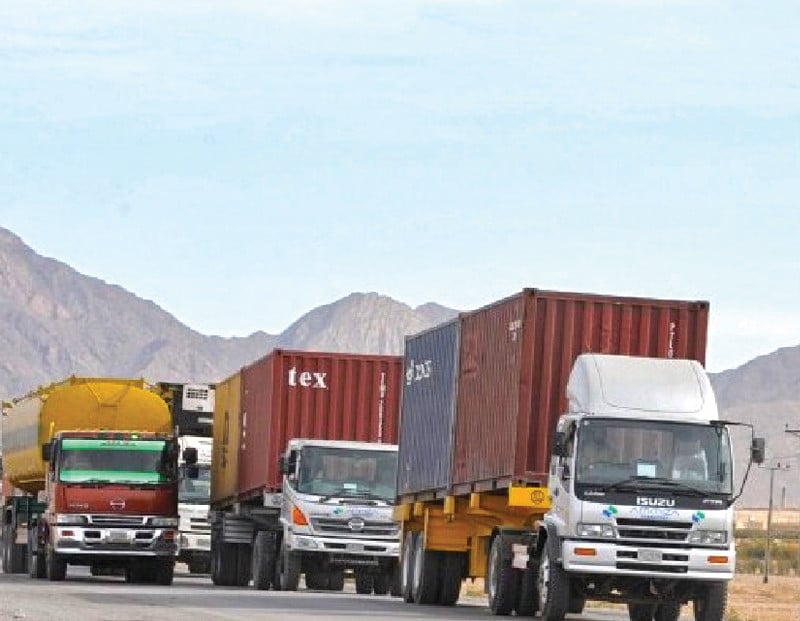Business leaders urge deferral of ALR | The Express Tribune

[ad_1]

Business leaders pointed out that transporters who will be worst affected will be the small owners of 10-wheelers and 14-wheelers, constituting about 60% of the trucking fleet of Pakistan – mostly family owned. photo: file
KARACHI:
Business leaders have called for deferring the Axle Load Regime (ALR) and its gradual implementation, cautioning that the immediate enforcement could push up import bills, reduce exports, skyrocket transportation costs, and heighten inflationary pressures in the country.
They said the ALR of the National Highway Safety Ordinance (NHSO) 2000 re-implemented on November 12, 2023 has been taking a heavy toll on trade. The abrupt implementation of this regime has adversely affected the supply and demand of trucks, increased transportation costs and is consequently propelling inflation to exorbitant levels.
Numerous business leaders have shared their views with The Express Tribune, highlighting that the previously-attempted ALR in 2019 had disastrous consequences. This included frequent disruptions in the supply chain in all trades and industries, particularly agri-based commodities, fertilisers, edible oil, cement, coal, steel and general consumer goods.
They pointed out that transporters who will be worst affected will be the small owners of 10-wheelers and 14-wheelers, constituting about 60% of the trucking fleet of Pakistan – mostly family owned. The total trucking fleet in the country is about 350,000 as the number of goods transport vehicles available for moving within the country is already less than the current requirement. It was cautioned that implementing the ALR in its current form is bound to create an overall shortage in local food and consumer goods supply. Without logical amendments made in this regime, the resulting national food security issues will impact the economy. Leaders suggested that both the documents including the national transport policy and NHSO-2000 need to be revised.
The leaders emphasised that if the rules and regulations in the ALR are amended to be harmonised with the current commercial requirements, and an inland waterway transport system is also developed simultaneously, along with improvements in Pakistan Railways’ freight capacity, this could lead to substantial reductions in freight costs. Ultimately, this would facilitate the desired recovery of the national economy.
It was added that the sudden imposition of this regime may hinder efforts of the Special Investment Facilitation Council (SIFC) as Pakistan’s exports will become even more uncompetitive than they already are. Moreover, this regime will scale up transportation costs, at a time when such costs need to be driven down for economic betterment. They strongly recommended and called for getting this ALR deferred and subsequently implementing it in a properly planned and phased manner.
Read
Fertiliser sector seeks delay in axle load regime
Notably, around 350,000 units of various axle trucks are operating in the country with a majority of them being three axle (10 wheelers) and six axle (22 wheelers). Before the implementation of the ALR, a trailer used to carry from 55 tonnes to 80 tonnes of cargo, while a high-wall truck could transport up to 30 tonnes of goods. However, after implementation of the ALR, they are lifting 39 tonnes and 17 tonnes respectively.
Some users had to get a stay order from the court of law for Karachi only as there is no highway within the port city where goods vehicles can carry 55 tonnes and 30 tonnes. However, vehicles travelling to the northern side are required to follow the ALR of 39 tonnes and 17 tonnes respectively.
They criticised the authority for imposing this ALR, citing concerns about highway conditions which are being broken. Business leaders added that users (import and export industry, heavy goods transporters etc) of highways can pay maintenance costs of the highways, but it is not good to import a large number of vehicles, tyres and ample fuel in order to fulfil the demands, while implementing the ALR.
“Once again, the imbroglio of ALR under NHSO-2000 has taken centre stage. It goes without saying that the issue must be resolved and sanity must prevail on the highways. There are concerns of cost, vehicle and sustainability. And, therein lie the burning issues and therein lie resentment and bitterness,” said Muhammad Najib Balagamwala, Chairman of Seatrade Group of Companies.
He noted that the prime distinctiveness at present is that there is a perennial shortage of road efficient trucks, which has resulted in excessive freight cost per trip.
He underscored the inflationary impact of added cost which is burdensome for the end-user. In addition to these, he noted the factor of delays in discharge from the port.
Published in The Express Tribune, February 25th, 2024.
Like Business on Facebook, follow @TribuneBiz on Twitter to stay informed and join in the conversation.
[ad_2]